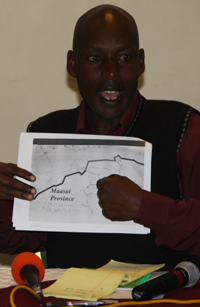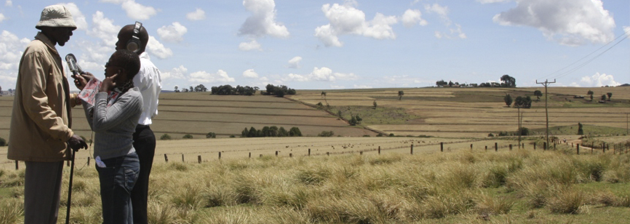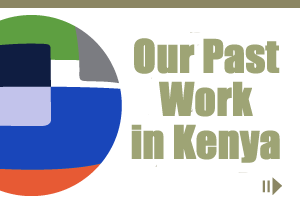"Maasais from Tipis area have no issue with their Kikuyu neighbors or with IDPs but have issues with those making policies,"Joseph ole Kipila, a representative of the Mau Narok Maasai community, told trainee journalists. "We had expected that when Rose Farm was acquired by the Government, priority was given to landless Maasais who were displaced when colonial authorities pushed them to native reserves. But they decided to resettle other people, and the conflict started," he explained.
Joseph was talking about the land conflict that erupted in 2010 in Mau Narok after the Government bought a 2,400 acre piece of land from farmer Lee Rose. The intention was to relocate there some of the Internally Displaced Persons (IDPs) from Nakuru to Rose Farm.But after a series of confrontations between Maasai protesters, locals from the Kikuyu community and the provincial administration, the Government announced that the IDP resettlement in the area had been cancelled.
 |
| Above:Joseph ole Kipila showing a scheme of the land in dispute |
This particular land dispute represented the theme and the field work of the first Land and Conflict workshop of the project held in Nakuru from April 11-15.It was also an opportunity to link the poor record of the current administration of relocating IDPs to an historical injustice.The 99 years lease that Maasai leaders signed with British settlers at the beginning of the colonization era had lapsed and the community expected the said land to be handed back to them. They said they had waited a century to be compensated.The expectation was suddenly challenged by a non inclusive government procedure, and anger erupted.
To find out more about the root causes of land disputes and report on them accordingly was one of the main objectives of the Land & Conflict workshop.Participants came from a wide cross section of stations from the Rift Valley and Kisumu, and for the first time the project trained print journalists.Over 10 stories on land were produced during the workshop.
Jared Oj’wang of Kisumu based Radio Nam Lolwe, produced this story:
The first training day was dedicated to land conflicts in the world. A session on land dynamics in South Africa, Palestinian Territories, Darfur, and Zimbabwe led by Callie Long -Internews Zimbabwe Country Director, made journalists understand that Kenya isn’t a unique case as far as land disputes are concerned.
The second day was about land conflicts history and dynamics in Kenya and about improving journalism skills as they relate to land disputes, including diversifying of sources, choosing language carefully and putting a human face to stories.
The third day of the workshop focused on Rift Valley land conflicts. Four case studies who have been directly affected by land conflicts in the Rift Valley shared their experiences with trainees.
Felix Omweri, a Constitutional expert from the Center for Legal Information and Communication in Kenya, said land issues would be addressed by the new Constitution when all legislation policies will be in effect. “The creation of a National Land Commission and other legal framework targeting community, private and public land will address social and economic inequalities”, he stated. “There are various avenues provided by the Constitution to seek restitution in case a community or an individual have issues that they consider as part of historical injustices,” added Mr. Omweri.
The two last days were dedicated to field work in Mau Narok and production.
The print journalists who attended the workshop were particularly happy with the workshop. “The training has changed the way I will be reporting land conflicts”, said Winstone Chiseremi of the People Daily. “I will play the role of a mediator in writing objectively without favoring any side”, he added. The story he produced during the workshop was about the impact of the Mau Forest land conflict on education and development of the area. “I learnt a new way of writing stories: humanizing complex stories” concluded Kennedy Lesiew of The Star.




